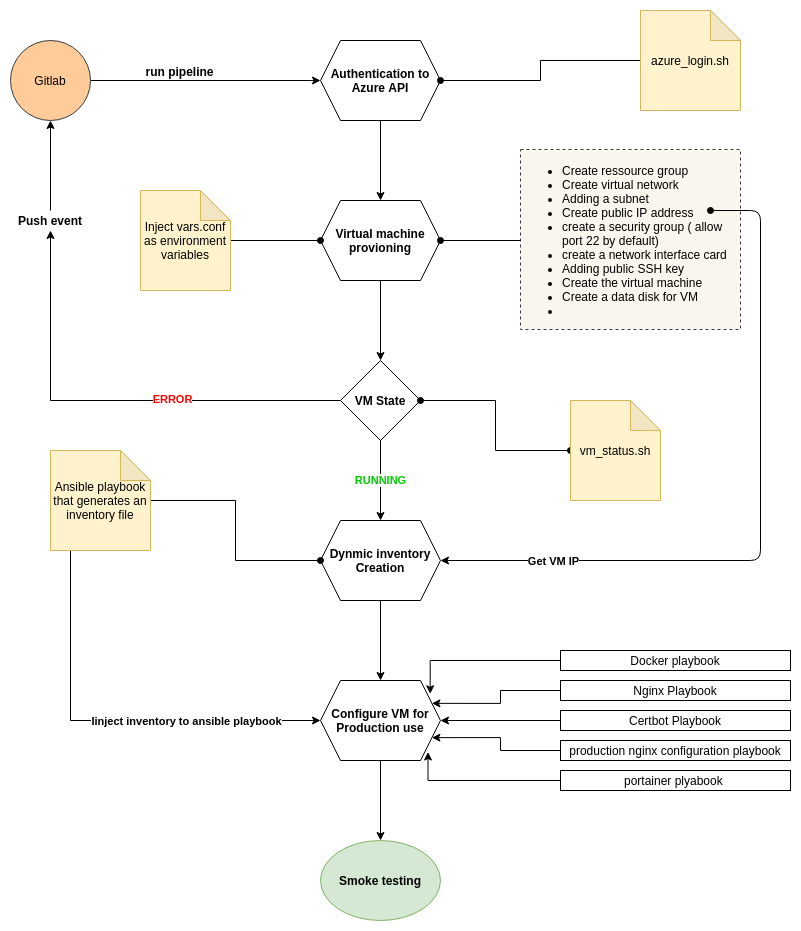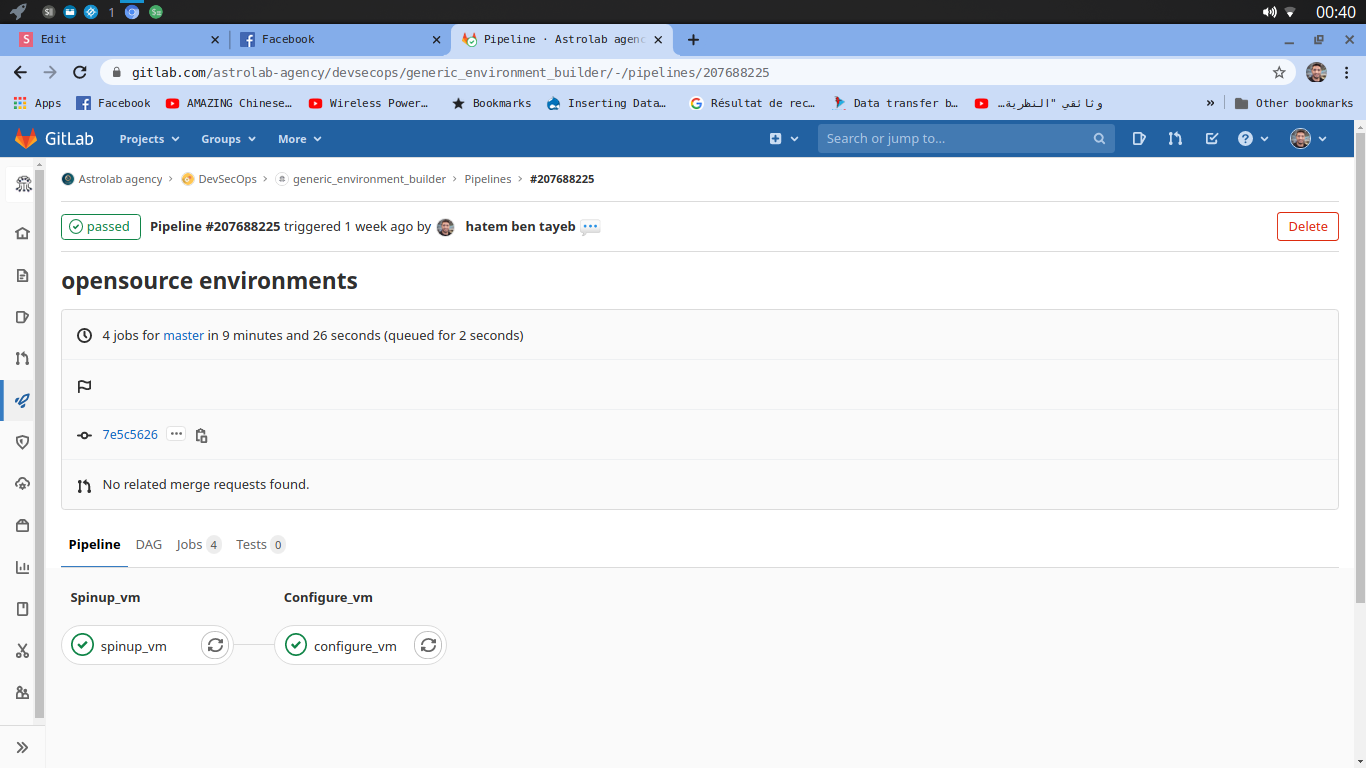Provision a Ready to GO Azure Server

Hatem Ben T yeb
Devops Engineer @ Astrolab-agency Sousse

linkedin.com/in/hatembentayeb/
facebook.com/htayeb2
Opensource Guy, Automation Enthusiast, Archlinux SuperFan
Architecture

Pipeline
- Run Pipeline
- Auth to azure
- Spin VM
- Check VM state
- Get VM IP
- Configure VM
Tools
- Docker : Custom Image that contains all necessary tools.
- Gitlab: It's our CI/CD server.
- Ansible: Spin and configure ou Server.
- Bash : Writing shell scripts.
- Az : Azure cli for authentication and VMs info.
Deep Dive
Push Vars.conf
Vars.conf is a configuration file that holds all your Server configuration like name, ssh-key, subnet, resource-group ...etc
RESSOURCE_GROUP_NAME="hello-server"
LOCATION="westus2"
VIRTUAL_NETWORK_NAME="hello-server-vnetwork"
VN_IP_PREFIX="10.0.0.0/16"
SUBNET_NAME="hello-server-subnet"
SN_IP_PREFIX="10.0.1.0/24"
PUBLIC_IP_NAME="hello-server-ip"
SECURITY_GROUP_NAME="hello-server-sg"
VIRTUAL_NETWORK_INTERFACE_NAME="hello-server-nic"
VIRTUAL_MACHINE_NAME="hello-server-vm"
VIRTUAL_MACHINE_SIZE="Standard_F2s_v2"
ADMIN_USERNAME="hello-server"
SSH_PUBLIC_KEY_PATH="/home/hello-server/.ssh/authorized_keys"
IMAGE_OFFER="UbuntuServer"
IMAGE_PUBLISHER="Canonical"
IMAGE_SKU='18.04-LTS'
IMAGE_VERSION="latest"
Run !
The pipeline cannot be launched automatically on push .. but only with specific parameters. either on gitlab or by a remote request with CURL
curl \
--request POST \
--form token=TOKEN \
--form ref=<branch> \
--form "variables[VM_PROVISION]=true" \
--form "variables[VM_CONFIG]=true" \
https://gitlab.com/api/v4/projects/<project-repo-id>/trigger/pipeline | jq
Looking Inside

Dev
Ops
Pipeline
The Gitlab pipeline is splitted into two main stages "spinup_vm" and "configure_m".
variables :
VM_PROVISION: "false"
VM_CONFIG: "false"
VALIDATE_PLAYBOOKS: "false"
stages:
- linting_playbooks
- spinup_vm
- configure_vm
# my customized image for the pipeline : hatembt/azure-ci (available in public on dockerhub)
linting_playbooks:
stage: linting_playbooks
image: hatembt/azure_ci:1.0
script:
- ansible-lint -x command-shell,formatting,repeatability spin_vm/*.yml
tags:
- gitlab-org-docker
only:
refs:
- master
variables:
- $VALIDATE_PLAYBOOKS == "true"
spinup_vm:
stage: spinup_vm
image: hatembt/azure_ci:1.0
variables:
DESIRED_STATE: "running"
before_script:
- ./azure_login.sh
script:
- set -o allexport
- source vars.conf
- set +o allexport
- ansible-playbook spin_vm/provision_vm.yml
after_script:
- set -o allexport
- source vars.conf
- set +o allexport
- ./check_vm_state.sh
tags:
- gitlab-org-docker
only:
refs:
- master
variables:
- $VM_PROVISION == "true"
configure_vm:
stage: configure_vm
image: hatembt/azure_ci:1.0
before_script:
- pip install netaddr paramiko
- ./azure_login.sh
- set -o allexport
- source vars.conf
- set +o allexport
script:
#- cat ${SSH_CFG} > "$CI_PROJECT_DIR/ssh.cfg"
- cd $CI_PROJECT_DIR && ansible-playbook config_vm/inventory_setup.yml
- mkdir -p "$CI_PROJECT_DIR/.ssh"
- cat ${PRIVATE_KEY} > "$CI_PROJECT_DIR/.ssh/id_rsa"
- chmod -R 600 "$CI_PROJECT_DIR/.ssh/id_rsa"
- export ANSIBLE_HOST_KEY_CHECKING=False
- cd $CI_PROJECT_DIR && ansible-playbook -i config_vm/inventory_bastion config_vm/configure_bastion.yml --private-key="$CI_PROJECT_DIR"/.ssh/id_rsa
after_script:
- rm -r "$CI_PROJECT_DIR/.ssh" || true
tags :
- gitlab-org-docker
only:
refs:
- master
variables:
- $VM_CONFIG == "true"
The pipeline stages are based on the image "hatembt/azure_ci:1.0"
Playbooks
Playbooks are written as tasks and then we include them on the main playbook to ensure flexibility
- name: configure VM
hosts: azure
gather_facts: no
become: yes
tasks:
# - import_tasks: playbooks/install_git.yml
# - import_tasks: playbooks/install_nodejs-12-lts.yml
# - import_tasks: playbooks/install_pm2.yml
- import_tasks: playbooks/install_nginx.yml
- import_tasks: playbooks/configure_nginx.yml
- import_tasks: playbooks/install_certbot.yml
- import_tasks: playbooks/install_docker.yml
Templates
Templates are based on {{ jinja2 }} syntax.
- name: generate inventory
hosts: localhost
connection : local
vars:
bastion_rg: "{{ lookup('env','RESSOURCE_GROUP_NAME') }}"
bastion_name: "{{ lookup('env','VIRTUAL_MACHINE_NAME') }}"
user: "{{ lookup('env','ADMIN_USERNAME') }}"
tasks:
- name : get bastion IP
script : ./get_vm_ip.sh "{{ bastion_rg }}" "{{ bastion_name }}"
register: ip_adderr
- name: store ip address
set_fact:
ip_address={{ ip_adderr.stdout }}
- name: templating inventory
template:
src: inventory.j2
dest: inventory_bastion
This playbook will generate an inventory file to be used by the main playbook to configure the Server
Screenshots
After Success of the two stages
we can check the server by
- Accessing IP address via port 80 and we should get nginx welcome page
- SSH with user, IP and private key


WrapUp
- Easy to use
- Flexible
- Extendible
- Easy to maintain
- Fast
- Reliable